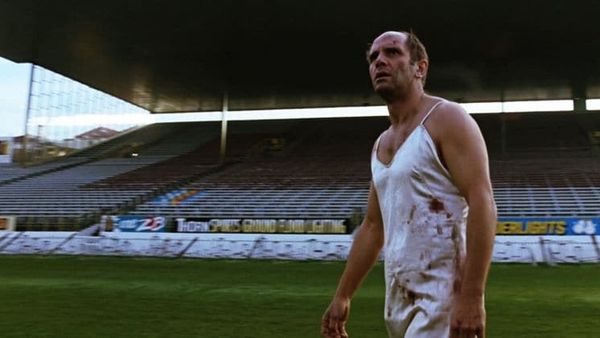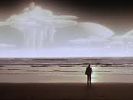Eye For Film >> Movies >> The Quiet Earth (1985) Film Review
The Quiet Earth
Reviewed by: Jennie Kermode

An overlooked gem in the science fiction canon which plunges into the oceans where the likes of Left Behind merely paddle, The Quiet Earth is a haunting, lyrical look at what it might be like to be alone on a planet that can get along just fine without us.
Bruno Lawrence is Zac, an ordinary middle-aged New Zealander who wakes up one day and happily spends time by himself before beginning to find it odd that there's no-one else around. No-one at all. Disbelief persists for some time; then there's panic; and gradually, resignation. Within this, the breakdown of social behaviours. Having none of the purposefulness of Will Smith's lone survivor in I Am Legend, he plunges into hedonism, moving into a mansion, dressing in silk negligees. By the time he eventually meets another human being - Alison Routledge's differently troubled Joanne - he's almost forgotten how to communicate. It's only the need to justify himself to someone else that propels him back into action and gives him the courage to ask the obvious questions. This is critical because, whilst she has no idea what has happened, it's possible he does.

A powerful study of loneliness, the film hinges on Lawrence's understated but profoundly sympathetic performance. Zac is just complex and unreasonable enough to remain interesting when doing nothing whilst remaining someone most people in the audience will be able to identify with. At the time of release, when most films in the genre featured assertive, traditionally masculine men, his ordinariness had a profound appeal, and Lawrence always makes him feel real. Believing in his loneliness, it's easy to understand the need that he and Joanne feel for one another, and the mix of relief and terror that ensues from this when they meet somebody else.
Much of the best science fiction functions as metaphor, enabling writers to explore themes that it would be impractical to take on in more conventional settings. The great strength of this film is not in anything techhnical or visually spectacular (both these elements are used sparingly) but in its human focus. The simplicity of its structure and core idea mean that it has aged much better than most of its peers, and unlike most similarly high concept films, it doesn't fall apart at the end but successfully ups the ante. Most of the cinematography is low key, so that when it wants to dazzle it can easily do so, and Geoff Murphy is a director who understands that less is often more. The quietness with the film lets it build up tension stealthily, putting Murphy in complete control, until the clamour of what is unspoken builds to a crescendo.
Reviewed on: 17 Jun 2017
















